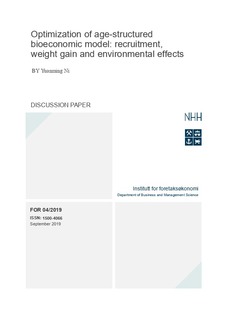| dc.description.abstract | More and more fishery researchers begin to acknowledge that one-dimensional biomass models may omit key information when generating management guidelines. For the more complicated age-structured models, numerous parameters require a proper estimation or a reasonable assumption. In this paper, the effects of recruitment patterns and environmental impacts on the optimal exploitation of a fish population are investigated. Based on a discrete-time age-structured bioeconomic model of Northeast Atlantic mackerel, we introduce the mechanisms that generate 6 scenarios of the problem. Using the simplest scenario, optimizations are conducted under 8 different parameter combinations. Then, the problem is solved for each scenario and simulations are conducted with constant fishing mortalities.
It is found that a higher environmental volatility leads to more net profits but with a lower probability of achieving the mean values. Any parameter combination that favours the older fish tends to lend itself to pulse fishing pattern. The simulations indicate that a constant fishing mortality around 0.06 performs the best. A comparison between the optimal and the historical harvest shows that for more than 70% of the time, the optimal exploitation precedes the historical one, leading to 43% higher net profit and 34% lower fishing cost. | nb_NO |
